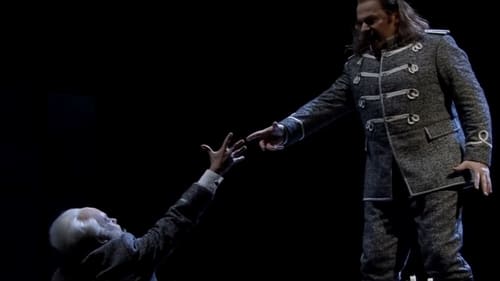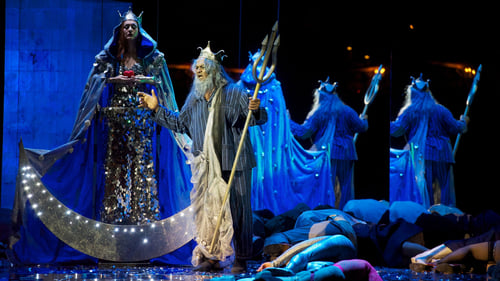
Director
On his military campaign abroad, an eccentric king is more concerned with conquering women than land. He always gets his way, until one day he falls for his brother’s secret lover. Xerxes’ tactics, which he changes as often as his opulent costumes, allow his opponents little time to rest. This results in a ‘baroque Muppet Show,’ as the celebrated Norwegian director Stefan Herheim describes his spectacular stage production. After a bewildering series of games of love and intrigue, Handel’s opera ends with the insight that life is a theatre in which one cannot always choose one’s own role.

Director
The dark world of Tchaikovsky’s penultimate operatic masterpiece Queen of Spades hinges on obsession, greed, and a secret in winning at cards… In 2005, the Opéra Bastille mounted a compelling production featuring Vladimir Galouzine as the mad lover Hermann, Hasmik Papian as the doomed Lisa, and Irina Bogatcheva as the mysterious Comtesse.

Director
Bregenzs Tales of Hoffmann is different from everything you saw before. The New York Times praised the thoughtfulness and creativity of Stefan Herheims new production, devised by the director as a search for ones own self in a sparkling drag show. A shining-toned (NYT) Hoffmann is embodied by tenor Daniel Johansson in the title role. He is supported by a fantastic cast: Rachel Frenkel is positively ideal as Muse and Niklausse (Kurier), Kerstin Avemo as Olympia is endowed with brilliant, cheekily extemporized coloraturas (Neue Zürcher Zeitung), Michael Volle sings the parts of Lindorf, Coppelius, Dr. Miracle and Dappertutto, the works four villains, with warmth and intensity (NYT) and Mandy Fredrich is a finelyphrased Antonia (Kurier).

Director
The French have occupied Sicily, and Hélène is held hostage by Montfort, the French governor, who has had her brother executed. She turns to the partisan Jean Procida and the rebellious patriot Henri in her bid for vengeance. Les Vêpres siciliennes is one of Verdi’s lesser-known mature operas, but was vital to his development as a composer. It was created for the Paris Opéra in 1855, providing Verdi with an opportunity to embrace the elaborate style and traditions of French grand opera. First seen at the Royal Opera House in 2013, this staging of Verdi's rarely-performed opera Les Vêpres siciliennes – directed by Stefan Herheim and conducted by The Royal Opera’s Music Director, Verdi specialist Sir Antonio Pappano – went on to win the prestigious Olivier Award for Best New Opera Production.

Stage Director
Antonin Dvorak’s next to last opera draws its substance from the underwater wonderland of little mermaids, Undines and Melusines: the water nymph Rusalka falls hopelessly in love with a prince and, although she is willing to sacrifice her voice to acquire the human form she needs in order to stay with him, the disparity between them proves to be too great. Jaroslav Kvapil’s libretto inspired Dvorak to compose a masterpiece, a compelling opera full of poignant lyricism and dramatic twists. Ádám Fisher and Stefan Herheim masterfully presented this ‘lyrical fairytale’ at La Monnaie in 2008. In this widely acclaimed interpretation, the fairytale elements sometimes assume frighteningly realistic dimensions so that one might see this enchanting production as a psychoanalytical study of male fantasies and female archetypes.

Director
Described by Tchaikovsky as ‘lyric scenes’, Eugene Onegin receives a spectacular reinterpretation from the Norwegian director Stefan Herheim. His productions create controversy and excitement around Europe, and here he takes Pushkin’s story of illusion, disaffection and frustrated love, and places the protagonists – world-weary Onegin and naïve, passionate Tatyana – in a triple temporal perspective, referencing the theatrical present, the period of the work’s composition, and the pageant of Russia’s history. Mariss Jansons, renowned for his mastery of Tchaikovsky’s symphonies, conducts this performance from Amsterdam’s Muziektheater.

Stage Director
Described by Tchaikovsky as ‘lyric scenes’, Eugene Onegin receives a spectacular reinterpretation from the Norwegian director Stefan Herheim. His productions create controversy and excitement around Europe, and here he takes Pushkin’s story of illusion, disaffection and frustrated love, and places the protagonists – world-weary Onegin and naïve, passionate Tatyana – in a triple temporal perspective, referencing the theatrical present, the period of the work’s composition, and the pageant of Russia’s history. Mariss Jansons, renowned for his mastery of Tchaikovsky’s symphonies, conducts this performance from Amsterdam’s Muziektheater.






